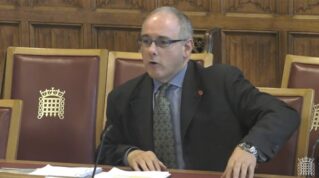The government has scrapped its flagship pre-employment skills programme following years of low starts, it has been confirmed.
Reports that emerged over the weekend were confirmed by skills minister Robert Halfon in a written ministerial statement in the House of Commons this morning.
Halfon said: “The traineeship programme has been running for nearly 10 years and the number of starts has remained relatively low.
“It is right, therefore, that we focus our offer on our mainstream provision. This change will make it easier for young people and employers to navigate our skills offer and will enable providers to better tailor their programmes to deliver the key skills needed to drive growth in local communities.”
From August 1, 2023, provision previously delivered through the traineeships programme will be “integrated” in to 16-19 study programmes for young people and the non-devolved adult education budget for adults. Mayors with devolved skills powers will decide what’s best for their areas, the statement says.
Official figures published last month showed there were 15,500 traineeship starts recorded in 2021/21 – just 36 per cent of the 43,000 target. It comes despite the Treasury investing £126 million in traineeships in 2021/22 and £111 million being pumped into the pre-employment programme the year before, when 17,400 starts were recorded against a target of 36,700.
Halfon points to “great alternatives” to traineeships, “such as T Levels and the T Level transition programme, bootcamps, apprenticeships, and sector-based work academies.”
However the body representing training providers as slammed the government’s decision as “an unmitigated disaster for social mobility.”

Jane Hickie, chief executive of the Association of Employment and Learning Providers (AELP), said:
“Axing traineeships would be incredibly short-sighted. The government’s own research on traineeships shows their effectiveness. Around three-quarters of all trainees have successful outcomes – either taking on work, starting an apprenticeship or further study – within 12 months.”
AELP has warned that the government’s plans to end funding for those currently with a 16-18 traineeships contract, but not a wider 16-19 study programmes contract “could be the final nail in the coffin for many” providers in light of rising costs of delivery in the training market.
Of the 136 providers with 16-18 traineeship contract allocation in 2021/22, only one, South West Regional Assessment Centre Limited received a wider 16-19 contract as a designated special post-16 institution.
“To announce this decision, without any form of consultation – and right before Christmas – is incredibly poor form,” Hickie said, adding: “Coupled with the planned level 2 and below reforms, this could be an unmitigated disaster for social mobility, by limiting access to skills training at entry level.”
Earlier this year FE Week revealed that more than half – £65 million – of the 2020/21 traineeships budget had to be handed back to the Treasury. A bigger underspend is now expected for 2021/22.
Some 290 training providers and colleges currently receive procured or allocated budgets for traineeships, ranging from £3.2 million at Strode College for 19-24 traineeships (procured) to Stoke-on-Trent City Council, which was allocated £5,500 for 19-24 traineeships.
Introduced as a flagship pre-employability programme in 2013, eligible 16 to 24-year-olds were funded by the Education and Skills Funding Agency for pre-employment training and unpaid work placements from six weeks to one year, although most last for less than six months.
But traineeship starts have been on a rapid decline, from a high of 24,100 in 2015/16 down to just 12,100 in 2019/20.
Ministers saw traineeships as a good route to help get young people back into training and work after the Covid-19 pandemic and decided to back the programme with more funding.
Officials have made numerous pleas with traineeship providers to rapidly boost their recruitment over the past two years.
But providers have often warned that the lack of learner incentive means that traineeships are currently limited to those willing and able to take on a placement without getting paid.
Others have argued that other government programmes that do offer payment, like Kickstart and apprenticeships, have systematically displaced traineeships.

















I could have saved them time as three years ago it was always going to fail
A great way to transition into an apprenticeship especially if you had not achieved the necessary grades from school. But for those students, many not academic but still very able, traineeships seemed like more of the same and they baulked at it. Plus the unpaid placement wasn’t appealing. A wasted opportunity all round sadly
Trying to get two Govt departments working together under the axe of austerity (DWP/JCP and DfE/ESFA) was doomed from the start.
A cynic might even say it was a tactic to ensure unspent funds went back to the Treasury.
“From August 1, 2023, provision previously delivered through the traineeships programme will be “integrated” in to 16-19 study programmes for young people and the non-devolved adult education budget for adults.”
The word ‘delivered’ is worthy of consideration – does that mean the unspent funds now drop out of the DfE budget entirely?
We currently have 18 learners on Traineeships programme ( and growing weekly) and we are building their confidence and ability to gain full-time employment. I’m disappointed with this, we need to help and develop the younger generation, not take it away from them.
We have a duty to show them how to conduct themselves and support their well-being.
Doomed from the start. No incentive for employers or students during work placement element.
Greater investment pre 16 needed. Alternatively, allow 14 year olds to do traineeships.
I believe that the kickstart scheme was one of the best programs that the government has ever provided to help young people and this scheme must be reintroduced as soon as possible. The scheme allowed the young people to do paid placement that motivated them, they received training and mentoring, gained skills, and experience, and explored roles, and the ones we supported found their career paths and are all back into long-term employment. The scheme worked because it gave employers incentives too to hire young workers. Light Foundations
I agree Esther, problem was many ended KickStart as the employers kept them on and they are back on benefits
Some of the previous comments miss the point -the traineeship scheme has been a key progression route for us to recruit learners and get them into Apprenticeships. We have a success rate of 80%+ each year and it allows SME employers to recruit beyond the start of the academic year. If it’s as easy as the wording says in that this kind of learning programme just transfers across to one of the other funding streams then fine but what if the provider doesn’t have one of those contracts? What the process for getting one? Will we even be allowed to get access to the other funding streams to be able to continue? I was at the AELP conference and the new CEO of the ESFA was making positive comments about working with the ITP sector and better communication and then they drop this bombshell. Disappointing doesn’t even cover what I and I suspect other will feel about this!
Completely agree Iain, we also have a direct Traineeship contract working with 60 starts every year. It has been a great pre apprenticeship programme with 85% of our students progressing into apprenticeships and HE. To suddenly scrap this programme which will impact on many providers is disgraceful and shameful of the government. Again, we like other providers don’t have a AEB or study programme so what happens to us! No automatic transfer to other funding streams, and no offer to gain access to these. How do you explain that to your tutors/assessors working on this contract!
This is yet another example of the governments short sighted approach to working in a woefully disadvantaged playing field for providers. We have had to endure the botched ROATP process 5 years ago, work with sub standard sub contractors to survive , come through Covid , and when we are just getting back to being an independence training provider, to survive again we will be forced to sub contract…again….through no fault of our own! Words cannot express how hard it is to be an ITP ….. there wont be many left soon. Unless you are a large college or large national provider your days are numbered. But I think that’s what the government wants. Merry Christmas!
When an official says they are going to work with you, it probably means they are expecting turmoil and it will be necessary to engage with you more than they previously had.
There is a massive gap for young people disengaged from traditional routes of learning especially those emerging from the cared sector. The traineeship would work if it had more incentives for the candidates and employer – it might be the difference between re-engaging that person into education and them going down an undesirable path.